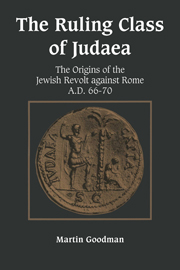Book contents
- Frontmatter
- Contents
- Abbreviations
- Preface
- Maps
- 1 Introduction
- PART I THE RULING CLASS A.D. 6–66
- PART II FACTION STRUGGLE WITHIN THE RULING CLASS
- 6 Reactions to failure: the ruling class a.d. 6–66
- 7 The outbreak of revolt
- 8 The independent Jewish state a.d. 67–70
- 9 Trends in faction politics a.d. 50–70
- PART III THE AFTERMATH OF THE REVOLT
- Select bibliography
- Index
7 - The outbreak of revolt
Published online by Cambridge University Press: 01 June 2011
- Frontmatter
- Contents
- Abbreviations
- Preface
- Maps
- 1 Introduction
- PART I THE RULING CLASS A.D. 6–66
- PART II FACTION STRUGGLE WITHIN THE RULING CLASS
- 6 Reactions to failure: the ruling class a.d. 6–66
- 7 The outbreak of revolt
- 8 The independent Jewish state a.d. 67–70
- 9 Trends in faction politics a.d. 50–70
- PART III THE AFTERMATH OF THE REVOLT
- Select bibliography
- Index
Summary
In a.d. 66 the ability of any of the ruling class to win power through the procurator's favour rapidly declined as the country moved towards revolt. The slide into war was rapid and dramatic.
Intercommunal tensions led to fighting between Jews and Greeks in the city of Caesarea early in the year. The procurator Florus favoured the Greek cause, as Nero had done six years earlier, and, ignoring Jewish grievances in that city, compounded his unpopularity with the Jews by taking seventeen talents from the Temple in Jerusalem ‘for Caesar's use’ (B.J. 2.293).
It is likely that the money was needed for arrears of tribute (cf. B.J. 2.405), but if so this justification for Florus' behaviour was ignored by his subjects and his action was greeted by widespread rioting in Jerusalem. Incensed by this display of opposition, and in particular by the ridicule poured on his greed by a few wits, Florus marched to the city and ransacked a good part of it. But when he attempted to achieve a public display of Jewish submissiveness by forcing the population to greet with humility two further cohorts sent from Caesarea, and to accept without demur the insulting silence with which their greetings were received by the troops (B.J. 2.318–19), his plan misfired and the mob's anger proved so violent that he was forced to withdraw to Caesarea himself, leaving only one cohort behind (B.J. 2.332).
- Type
- Chapter
- Information
- The Ruling Class of JudaeaThe Origins of the Jewish Revolt against Rome, A.D. 66–70, pp. 152 - 175Publisher: Cambridge University PressPrint publication year: 1987
- 1
- Cited by



